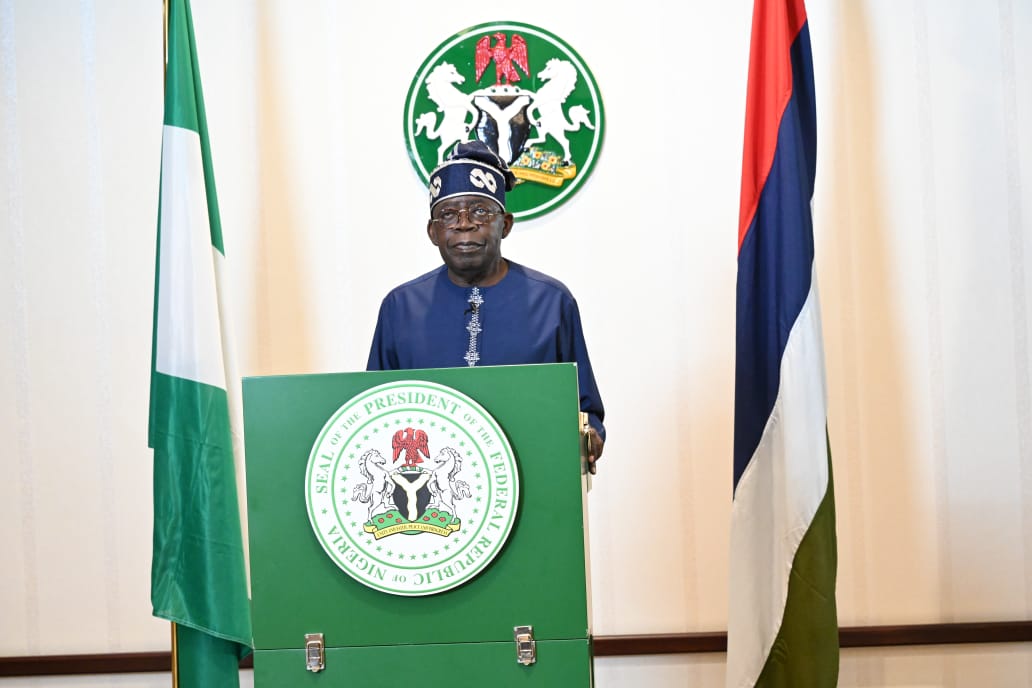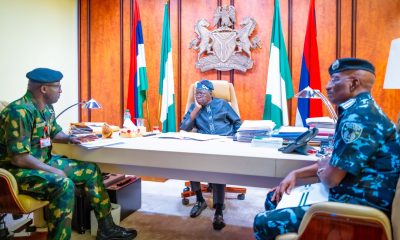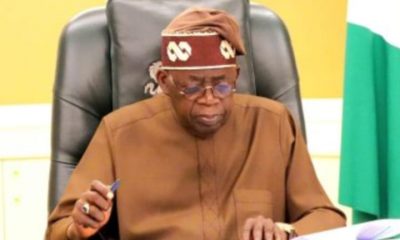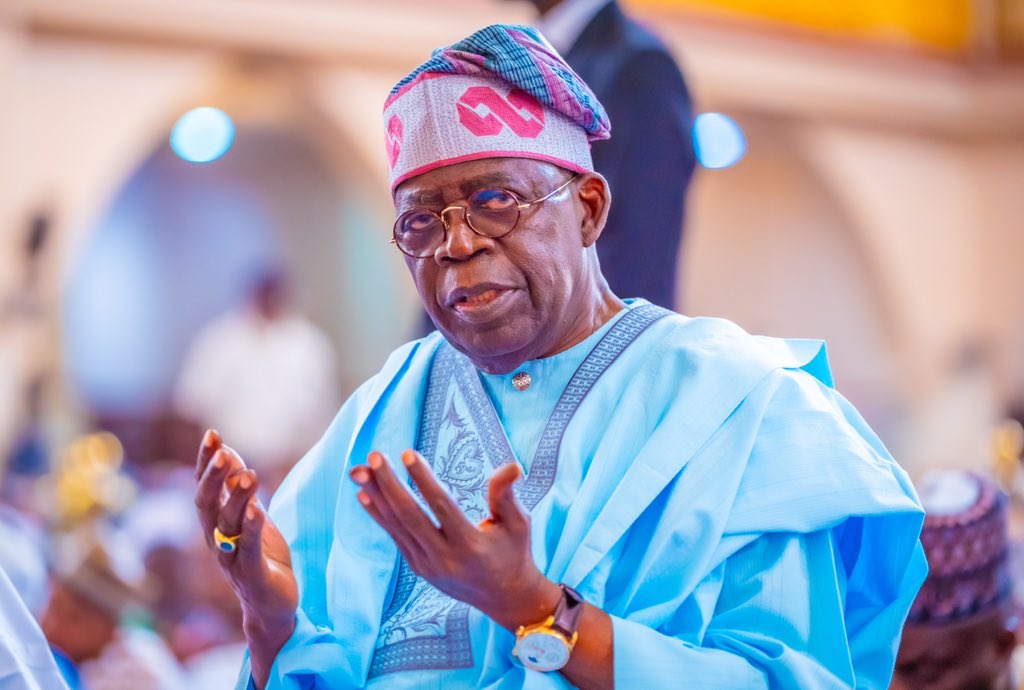General
G20 Summit: Tinubu Endorses Global Alliance Against Hunger, Poverty

By Adedapo Adesanya
President Bola Tinubu has committed Nigeria to the creation of the Global Alliance Against Hunger and Poverty, championed by President Luiz Inacio Lula da Silva of Brazil.
President Tinubu described the alliance as pivotal in the global fight against hunger and poverty.
At the 19th G20 Leaders Summit opening session in Rio de Janeiro, Brazil on Monday, the Nigerian leader lauded the initiative, describing it as the right step to address one of the world’s most significant challenges.
“This bold and visionary step underscores Brazil’s leadership in addressing one of the most urgent and persistent challenges facing our world today.
“The creation of this Alliance marks a significant milestone in our global efforts to eradicate hunger and poverty, and it also sends a powerful message of solidarity to vulnerable populations around the globe.
“By fostering collaboration between governments, international organisations, and civil society, this initiative offers a comprehensive approach not only to addressing immediate needs but also tackling the structural causes of hunger and poverty,” he said.
President Tinubu compared the global initiative to one of the eight priority areas he outlined at his inauguration 18 months ago, expressing Nigeria’s eagerness to adopt international best practices to advance its economic development.
According to him, Nigeria’s endorsement of the declaration of commitment to join the Global Alliance is a significant step in its efforts to address hunger and poverty, by leveraging international cooperation and resources to bolster domestic strategies.
He added that by supporting the initiative, Nigeria also demonstrates a solid commitment to realising the Sustainable Development Goals (SDGs), particularly SDG 1, which focuses on eradicating poverty, and SDG 2, which aims to achieve zero hunger.
“These goals are at the core of Nigeria’s development agenda, and the Alliance offers a platform to accelerate progress towards them,” Mr Tinubu said.
“By collaborating with international partners, Nigeria aims to leverage best practices, innovative solutions, and financial support to enhance its efforts to combat poverty and hunger. The endorsement reinforces Nigeria’s role as a key player in global efforts to promote sustainable development and improve the quality of life for all its citizens,” President Tinubu said.
He emphasised the urgent need for the United Nations Security Council reform to ensure its continued relevance in global interventions, reiterating Nigeria’s readiness and capability to represent Africa within this elite.
He called on the G20 to champion this noble ideal, having admitted the African Union as a group member.
“The Security Council should expand its permanent and non-permanent member categories to reflect the world’s diversity and plurality. Africa deserves priority in this.
“The Security Council should expand its permanent and non-permanent member categories to reflect the world’s diversity and plurality better.
“Africa deserves priority in this process, and two permanent seats should be allocated to it with equal rights and responsibilities. Nigeria stands ready and willing to serve as a representative of Africa in this capacity.”
In the statement read on his behalf by the Minister of Foreign Affairs, Mr Yusuf Tuggar, President Tinubu noted that the G20 now wears a toga of a forward-looking international institution that upholds reform-minded multilateralism.
He especially commended the decision by the G20 to grant permanent membership to the African Union and for its consistency in sustaining the tradition of inviting guest countries to join the group.
This broad participation, he said, allows the opportunity for more inclusive and effective discussions to address shared global challenges.
“Some permanent members of the Council have shown promising signs of support for this process, which is a positive development. We welcome this shift in attitude and call for a faster pace to the long overdue change.
“The world faces various challenges, including extreme poverty, inequality, climate change, terrorism, and global conflicts.
“These issues are exacerbated by longstanding inequities in the global governance system, which have led to unsustainable sovereign debt and distortions in access to capital markets, trade imbalances, unfair representations and hindered development in the Global South.
“It is our responsibility to find pragmatic solutions to fix these imbalances.
“Particularly pressing is global taxation, which profoundly impacts developing countries.
“The current international tax system, largely shaped by the interests of more affluent nations, often leaves developing countries at a disadvantage, especially in taxing digital economies.
“This systemic imbalance has led to significant revenue losses, hampering our efforts towards sustainable development and economic self-reliance,” the Nigerian leader said.
General
Nigerian Bottling Company Bridges Education, Employability Gap

By Modupe Gbadeyanka
The Nigerian Bottling Company (NBC) has reaffirmed its determination to bridge the gap between education and employability in the country by sustaining its flagship Youth Empowered (YE) programme.
This initiative provides hands-on learning, real-world insights, and access to career-shaping opportunities to young Nigerians.
The 2026 edition of the scheme commenced on February 2 at the University of Lagos (UNILAG), with participants mainly young people between the ages of 16 and 35.
A statement from the organisation said this year’s rollout will expand to more tertiary institutions, including the Federal University of Technology, Akure (FUTA). This follows a successful 2025 tour that reached seven cities across the country, including Makurdi, Jos, Benin, Kaduna, Asaba, Akure, and Port Harcourt.
Participants in the 2026 programme will receive training across key modules designed to support personal, professional, and business growth, including Business Life Skills, Adaptability and Resilience, Financial Literacy, Customer Service and Communication, Sales and Negotiation Skills, and Workplace Ethics.
The sessions will also feature breakout workshops on Business Planning, Project Management, and Time Management, alongside the Director’s Grant Pitch Competition, where participants can pitch their ideas for a chance to win business funding.
In addition to skills development, NBC’s People and Culture team will be present throughout the programme to identify outstanding talent for future opportunities within the organisation, further strengthening the connection between learning, employment, and long-term career growth.
One of the participants at the UNILAG training, Waliat Adedogun, who received a cash grant through the Director’s Grant Pitch Competition to support her small business, said: “Youth Empowered gave me more than training; it gave me clarity and confidence. Winning the grant means I can finally take my business idea from a dream into something real. I now feel prepared to build, grow, and create opportunities not just for myself, but for others too.”
Since its launch in 2017, the scheme has impacted more than 70,000 young Nigerians, equipping participants with practical skills, confidence, and exposure needed to succeed in today’s dynamic workplace and entrepreneurial landscape.
This year’s programme is being delivered in collaboration with Fate Foundation as the implementing partner, with funding support from The Coca-Cola HBC Foundation.
Last year, 10 beneficiaries were selected for six-month paid internships across NBC locations in Lagos, Ibadan, Asejire, and Challawa, gaining direct industry exposure.
Additionally, three outstanding participants received sponsorship for an all-expenses-paid intensive culinary training programme and were awarded N1 million each to support the launch of their businesses.
General
INEC Fixes February 20 for 2027 Presidential, NASS Elections

By Modupe Gbadeyanka
The 2027 presidential and National Assembly elections will take place on Saturday, February 20, the Independent National Electoral Commission (INEC) has revealed.
In a notice for the 2027 general polls issued on Friday, the electoral umpire also disclosed that the governorship and state assembly elections for next year would be on Saturday, March 6.
Speaking at a news briefing in Abuja today, the chairman of INEC, Mr Joash Amupitan, expressed the readiness of the commission to conduct the polls next year, which is 12 months away.
The timetable issued by the organisation for the polls comes when the federal parliament has yet to transmit the amended electoral bill to President Bola Tinubu for assent.
This week, the Senate passed the electoral bill, reducing the notice of elections from 360 days to 180 days, while the transmission of results was mandated with a proviso.
Recall that on February 4, INEC said it was ready to go ahead with preparations for the elections despite the delay in the passage of the amended electoral law of 2022.
General
NGIC Pipeline Network to Experience 4-Day Gas Supply Shortage

By Modupe Gbadeyanka
The pipeline network of the NNPC Gas Infrastructure Company Limited (NGIC) will witness a temporary reduction in gas supply for four days.
This information was revealed by the Chief Corporate Communications Officer of the Nigerian National Petroleum Company (NNPC) Limited, Mr Andy Odeh, in a statement on Thursday night.
A key supplier of gas into the NGIC pipeline network is Seplat Energy Plc, a joint venture partner of the state-owned oil agency.
It was disclosed that the facility would undergo routine maintenance from Thursday. February 12 to Sunday, February 15, 2026.
The NNPC stated that, “This planned activity forms part of standard industry safety and asset integrity protocols designed to ensure the continued reliability, efficiency, and safe operation of critical gas infrastructure.”
“Periodic maintenance of this nature is essential to sustain optimal system performance, strengthen operational resilience, and minimise the risk of unplanned outages,” it added.
“During the four-day maintenance period, there will be a temporary reduction in gas supply into the NGIC pipeline network. As a result, some power generation companies reliant on this supply may experience reduced gas availability, which could modestly impact electricity generation levels within the timeframe.
“NNPC Ltd and Seplat Energy are working closely to ensure that the maintenance is executed safely and completed as scheduled. In parallel, NNPC Gas Marketing Limited (NGML) is engaging alternative gas suppliers to mitigate anticipated supply gaps and maintain stability across the network,” the statement further said.
“Upon completion of the maintenance exercise, full gas supply into the NGIC system is expected to resume promptly, enabling affected power generation companies to return to normal operations,” it concluded.
-

 Feature/OPED6 years ago
Feature/OPED6 years agoDavos was Different this year
-
Travel/Tourism10 years ago
Lagos Seals Western Lodge Hotel In Ikorodu
-

 Showbiz3 years ago
Showbiz3 years agoEstranged Lover Releases Videos of Empress Njamah Bathing
-

 Banking8 years ago
Banking8 years agoSort Codes of GTBank Branches in Nigeria
-

 Economy3 years ago
Economy3 years agoSubsidy Removal: CNG at N130 Per Litre Cheaper Than Petrol—IPMAN
-

 Banking3 years ago
Banking3 years agoSort Codes of UBA Branches in Nigeria
-

 Banking3 years ago
Banking3 years agoFirst Bank Announces Planned Downtime
-

 Sports3 years ago
Sports3 years agoHighest Paid Nigerian Footballer – How Much Do Nigerian Footballers Earn




















